Text

Vin encendanenye i túrin i cormaron olla i otsolametta ar nánye ita endarusta rá i nasse vin oluvanye.
Lintie ná olda illi polin sana pa.
Illi vaiala.
Sercenya líra mi Quenya sír.
i just rewatched lotr (extended) over the weekend and i am so sorry for the person i am about to become. it has quickly become all i can think about. all encompassing. my blood sings in elvish rn
#everythingquenya#quenya#look i mainly did this for the last line#i loved it#also: mood#literally me recently
111 notes
·
View notes
Text

When does a man become a monster?
#quenya#everythingquenya#tengwar#silmarillion#maedhros#kinslaying#epic the musical#everything quenya#just a man#when does a monster become a man?#a rare lina art
13 notes
·
View notes
Text
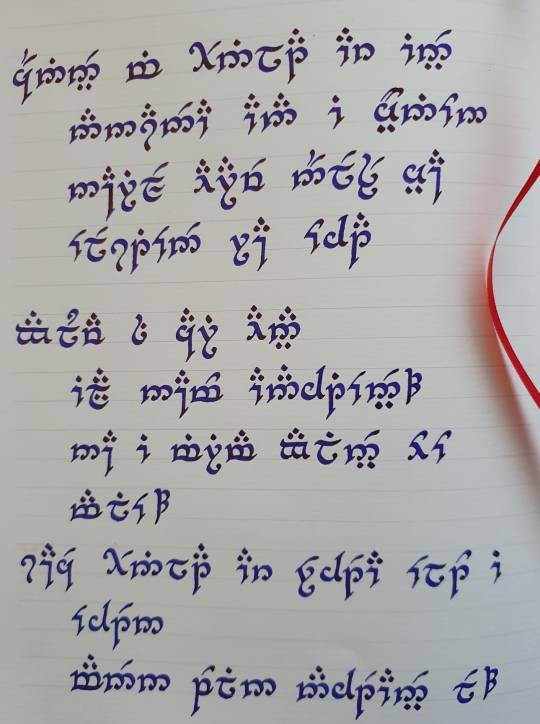
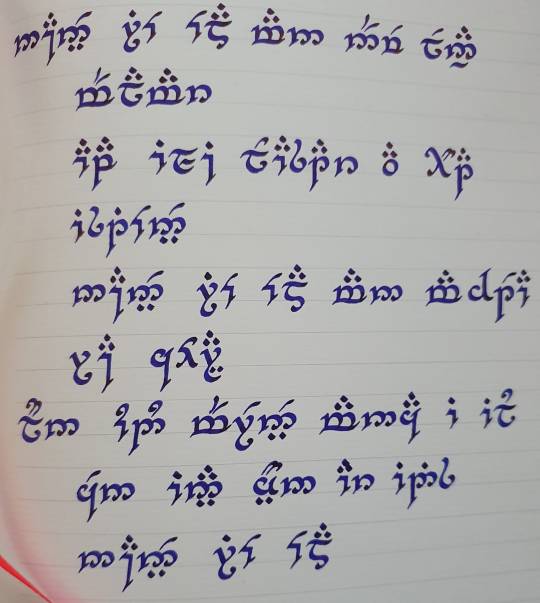
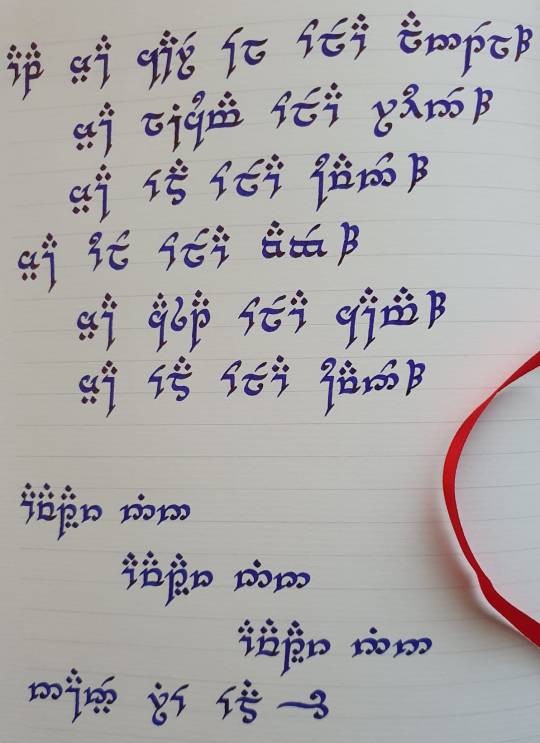
"Just A Man" from Epic the Musical by Jorge Rivera-Herrans
This song made me think of when Maglor and Maedhros found Elrond and Elros after the 3rd kinslaying in the first age. Of course I had to then translate it. I split the lyrics up a bit, so they both had lines. (Also left out the chorus in the transcriptions)
[MAGLOR:]
Céninye mi henilta ar inye
Nansanea ana i yónion
Nárille airave nélesse yá elestienye rá ohta
[MAEDHROS:]
Nwaluva si cari ainya
Ilya námo anahtienye?
Ná i mirma nwalinye oio malie?
[MAGLOR:]
Sáce henilta ar rehtea elto i ehten
Manen polin nahteanye le?
[MAEDHROS:]
Nánye rie elda man néve lenna mélamar
Apa illí loastar au hóta istienye
Nánye rie elda man mahtea rá coirya
[MAGLOR:]
Lún undu mérenye manca i ilu cen inya yón ar indis
Nánye rie elda
[MAEDHROS:]
Apa yá cáre él olea lantel?
Yá lícuma olea ruine?
Yá elda olea úvano?
[MAGLOR:]
Yá ulo olea vangwe?
Yá casta olea cáma?
Yá elda olea úvano?
[MAEDHROS & MAGLOR:]
(Yá cáre él olea lantel?)
(Yá lícuma olea ruine?) Avatyar nin
(Yá elda olea úvano?) Avatyar nin
(Yá elda olea úvano?) Avatyar nin
#quenya#everythingquenya#tengwar#epic the musical#epic#maedhros#maglor#this is going off that memory i have of maglor potentially maybe having a spouse back in aman#it was nice to do some elvish again after my last break#silmarillion#also just a man is such a good song#i love epic so much#jorge rivera-herrans#that is all
53 notes
·
View notes
Text

ála nyélna. orta caslya halla. merisse lenna. merisse lenna.
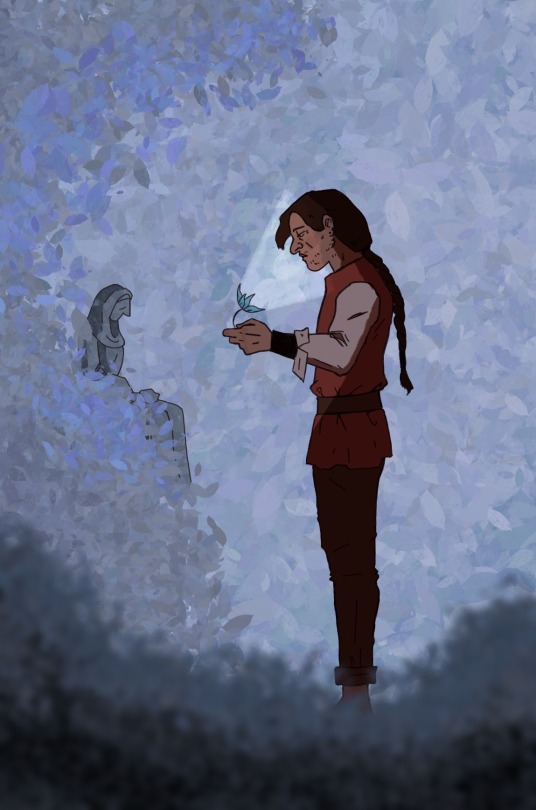
dont cry. hold your head up high. she would want you to. she would want you to
117 notes
·
View notes
Text
I would have rbed your flop post, my brother, my captain, my king.
#let me try and fix this#fellow tolkien fans we cant let this post flop#posts that have 10k posts to me
3K notes
·
View notes
Text
Andor
Andor
205 notes
·
View notes
Note
Which pens do you use for writing? :D
Hello! I use a Lamy pen that a friend recommended to me when we visited a Lamy store. I really don't know as much as I should about these pens, but it has a 19 on it, so I'm assuming that's the strength of the nib? Hope that helps and thanks for asking! 💕
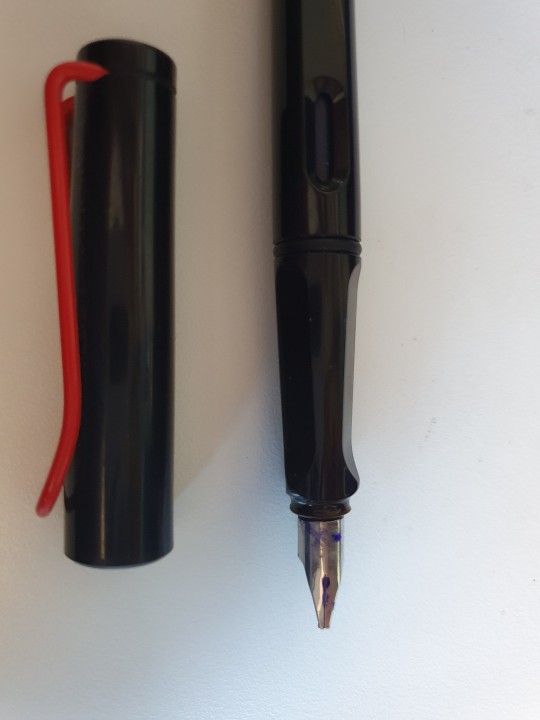
2 notes
·
View notes
Photo
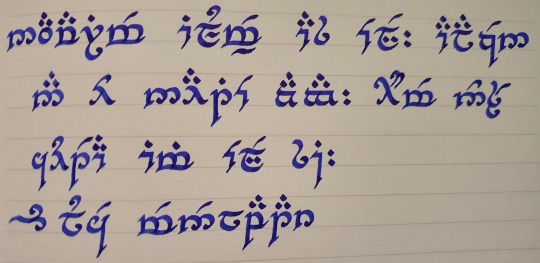
“Nauvarimme illume as elye. Alaquen na oi naitie vanwa. Húme nosse cuitea imi elye sí.”
“We’ll always be with you. No one’s ever really gone. A thousand generations live in you now.”
Luke Skywalker, Star Wars Episode IX: The Rise of Skywalker
#quenya#everythingquenya#luke skywalker#the rise of skywalker#a meh film to me but i like this quote#i replaced generations though with kindred/family#because quenya doesn't have it's own word for that#i don't think the elves ever had to think about that
20 notes
·
View notes
Text
Generations
I was translating a sentence that contained the word generations and couldn’t find an Elvish word for it. It really made me start thinking about how the Elves though.
Quenya is the language of the Elves that went to Valinor. The first ones to emerge in the world and they had no parent besides Illúvatar. They settle the lands of the Valar, basking in the lights of the Two Trees and give birth to their children. Their children age and give birth to their own children and so on. The Vanyar, Teleri and Noldor have words for their parents and grandparents and for kindred and family, but none for generations.
Why would they?
Humans have the concept of generations because we have the idea of the beginning of a generation and the end of a generation. Where the era of one generation ends, another begins. Humans are mortal and have a finite time on Middle-Earth.
The eldar are timeless. They are born and unless killed they spend eternity in their prime. There is no end or beginning of a generation. A man could have a son and a grandson and after enough time they could be mistaken for brothers because they don’t age like humans. The very eldest could grow beards (thank you Círdan, love you bro) and one could sense greater wisdom or power among the elder eldars, but from a distance a family gathering would probably look very odd by our human standards.
The concept of generations probably didn’t need to be considered until the eldar encountered mortal men. By then Quenya had been forbidden in Thingol’s realms. Sindarin was the common tongue. I think it would be far more likely to find a word for generations in Sindarin.
#quenya#everythingquenya#generations#lina's word ramble#i might start this as a new series#please discuss#i want to know other's thoughts
4 notes
·
View notes
Photo

“Á cara cea mehtari nem me tuxa.”
“Make ten men feel like a hundred.”
- Cassian Andor, Rogue One
#in honor of andor#quenya#everythingquenya#andor#cassian andor#rogue one#i love love love rogue one and cassian#and since i 'm fixated on star wars at the moment#i had to#so excited for the next episodes
18 notes
·
View notes
Note
Hiya, I'm a classical / film score / OC score composer and I'm writing an SATB choral piece for the Ainulindale and I'm having trouble understanding the stressed syllables on the words. I know in general the rule is if there's 3 or more syllables you accent the third to last syllable, unless there's an acute accent (which I think doesn't include the fun dots). But I'm not 100% sure and I don't want to write a whole piece with the wrong emphasis on the wrong syllable. Lmk if you have a recording of you reading the Quenya version of the Ainulindale or how to do that! I'm using the one written on https://www.elvish.org/gwaith/ainulindale.htm by Ryszard Derdzinski. Lmk if this is the wrong one XD
Yoooo wow tumblr thank you for never showing me this ask! I hate this hellsite sometimes.
Sorry it took me so long to respond! 🥲
So, according to my books when you have a word with two syllables, then the focus is on the first syllable. E.g. Anor ['a.nor], parma ['par.ma]
With three syllable words there are two options.
A. The second to last syllable is long
In this case the second to last syllable is the main focus. A long syllable contains either a long vowel (á, é, í, o´, ú), a diphtong (ai, oi, ui, au, eu, iu) or multiple consonants after a vowel.
Examples:
Olórin (long vowel: ó)
Úlairi (Diphtong: ai)
Isildur (two consonants after the vowel: ld)
Menelya (the y counts as a consonant: ly)
B. The second to last syllable is short
If the second to last syllable is short, the third to last syllable is emphasized. A short syllable contains a short vowel or one or no consonants.
Examples:
Orome (second to last syllable is -ro: short vowel followed by a consonant)
Anárion (second to last syllable is -ri: short vowel, not followed by a consonant)
By adding endings such as -ndil, -rdur, -rdil, ldur the emphasis can be shifted. Such as the word "isil" (moon, a noun) and "Isildur" (servant of the moon, a name). In "isil" the emphasis is on the first vowel. In "Isildur" the emphasis is on "sil".
Concerning the fun dots, in tengwar the dots and dashes indicate vowels. It's very similar to Arabic in that regard. The larger letters are generally consonants while the dots and dashes are vowels.
I don't have a recording of myself reading the Ainulindale, but I've been speaking it from what I've heard from the movies and listened from songs. There's a German singer/songwriter called Oonagh and a lot of her songs have Quenya in them! Since German pronunciation is very similar to Quenya, that helps quite a bit with pronunciation. Here are three songs of hers that feature quite a bit of Quenya. Song 1. Song 2. Song 3. (You’ll usually have to wait for the chorus, sorry. 😅)
Another thing I would point out is that the elves are very lyrical. They will forgive emphasis if it works better for the song. (At least that's what I remember reading somewhere) I don't think you need to worry to much about emphasis. My personal pet peeve would be pronunciation more than emphasis of the correct syllable.
I really hope this helps and good luck with your project! I'd love to hear it when it's finished! 🥰
9 notes
·
View notes
Note
This ☝🏼
I like this addition.
two questions:
I know that translation is very rarely about literal one to one translations and instead about translating the idea or the feel of a thing. Idioms and insults and all of that. In that mind, what would the Quenya equivalent of the insult "Bitchboy" be? I need something petty and diminutive to call Melkor in a fic I'm prepping notes for. In the context of an elder being that's hanging around and annoying him and stuff.
Also relevant to the fic, would Avakúmaien be grammatically correct as a name given to a (womanish) entity that had its origins in the Abyss? If not, what would be most appropriate?
Thanks for the help! If/when you get to this ask.
Oooooh this is fun to figure out!
So, after looking up a few definitions of “bitchboy” I think the definition of some who is annoying and whines/cries a lot was fitting for this context. I tried finding a good word for whining or crying and found “mawa” from early primitive Elvish. It can mean cry or bleat which I thought was fitting. I’d tack “mo” at the end there from primitive Elvish to denote person. End result would be “mawamo” which I like because it remind me of someone going ‘waaaawaaa’ and crying about something in an annoying way. Plus the added insult of bleating like a sheep, which can symbolize blindly following a shepard or the herd.
As for Avakúmaien, I’m assuming yo’re using “ava” - “outer/beyond” and “kúma” - “void/empty” while “ien” would translate to “daughter of”. So, Daughter of the Outer Void or Beyond the Void. This would be a good Ataresse or Father-Name. This is usually a childhood name and like a surname or as close to as the elves can get.
I think this is a really neat name, but at the same time makes me wonder. Melkor later gets cast into the Void from which he can’t return until the end of all things, but the Ataresse you created makes it sound like your character is from beyond even that Void? Wouldn’t that be where Ilúvatar would be? I still think it works fine though.
There are quenya words for abyss or hell though. “Undume” and “fatanyu” respectively. Those can be turned into Undumiel/-ien or Fatanyiel/-ien to mean Daughter of the Abyss or Daughter of Hell.
I hope this helps anon! 🤗
9 notes
·
View notes
Note
two questions:
I know that translation is very rarely about literal one to one translations and instead about translating the idea or the feel of a thing. Idioms and insults and all of that. In that mind, what would the Quenya equivalent of the insult "Bitchboy" be? I need something petty and diminutive to call Melkor in a fic I'm prepping notes for. In the context of an elder being that's hanging around and annoying him and stuff.
Also relevant to the fic, would Avakúmaien be grammatically correct as a name given to a (womanish) entity that had its origins in the Abyss? If not, what would be most appropriate?
Thanks for the help! If/when you get to this ask.
Oooooh this is fun to figure out!
So, after looking up a few definitions of "bitchboy" I think the definition of some who is annoying and whines/cries a lot was fitting for this context. I tried finding a good word for whining or crying and found "mawa" from early primitive Elvish. It can mean cry or bleat which I thought was fitting. I'd tack "mo" at the end there from primitive Elvish to denote person. End result would be "mawamo" which I like because it remind me of someone going 'waaaawaaa' and crying about something in an annoying way. Plus the added insult of bleating like a sheep, which can symbolize blindly following a shepard or the herd.
As for Avakúmaien, I'm assuming yo're using "ava" - "outer/beyond" and "kúma" - "void/empty" while "ien" would translate to "daughter of". So, Daughter of the Outer Void or Beyond the Void. This would be a good Ataresse or Father-Name. This is usually a childhood name and like a surname or as close to as the elves can get.
I think this is a really neat name, but at the same time makes me wonder. Melkor later gets cast into the Void from which he can't return until the end of all things, but the Ataresse you created makes it sound like your character is from beyond even that Void? Wouldn't that be where Ilúvatar would be? I still think it works fine though.
There are quenya words for abyss or hell though. "Undume" and "fatanyu" respectively. Those can be turned into Undumiel/-ien or Fatanyiel/-ien to mean Daughter of the Abyss or Daughter of Hell.
I hope this helps anon! 🤗
9 notes
·
View notes
Text
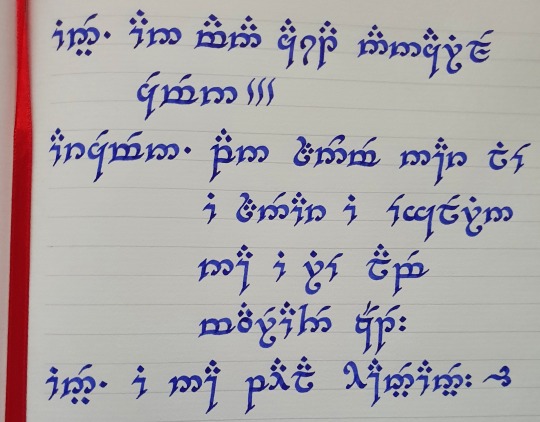
inye: an mana casta nancarille kemen!!!
arkemen: pan sanome nár i lie i sanear i englerin ná i rie lambe maureante quéte
inye: i ná faila hányeanye
me: why are you destroying earth!!!
aliens: because theres people who think that english is the only language they need to speak
me: thats fair i understand
#everythingquenya#quenya#tengwar#a rush job but i am feeling strangely productive today#it is physically hurting me to not capitalize some of the letters here#memes#funny#makes me laugh
566K notes
·
View notes
Text
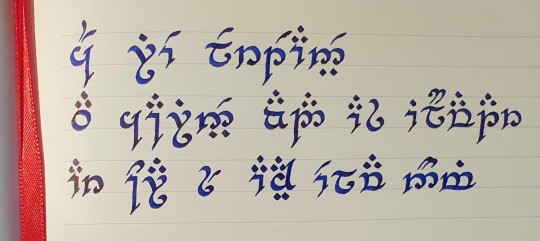
Cé rie lerteanye
Au cárinye vanda as Ilúvatar
Ar óra se ahya elva nómi
If I only could, I'd make a deal with God and get him to swap our places.
14 notes
·
View notes
Photo
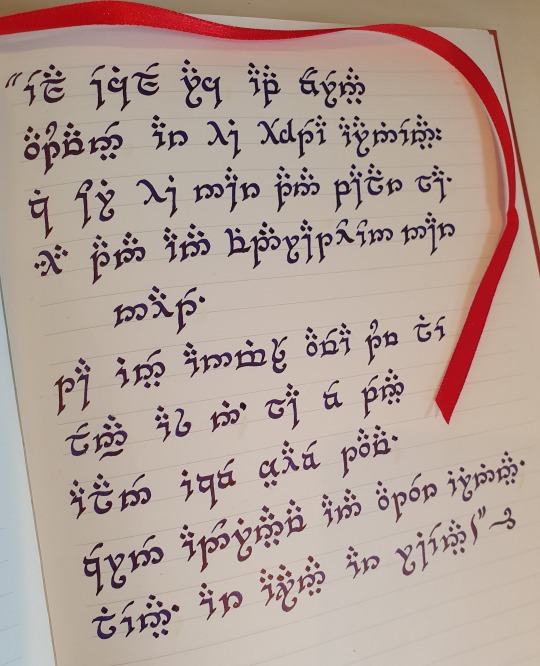
‘Yours ye may break, but I my bond
must keep, and kingdom here forsake.
If hearts here were that did not quake,
or that to Finrod’s son were true,
then I at least should find a few
to go with me, not like a poor
rejected beggar scorn endure,
turned from my gates to leave my town,
my people, and my realm and crown!’
Finrod Felagund, King of Nargothrond
Lay of Leithian 224-232
Beren and Lúthien p.119
Keep reading
80 notes
·
View notes
Note
After Thingol passed, would Quenya still be considered banned in Imladris, Lothlorien, or (maybe most likely) Eryn Lasgalen? Or did it just ‘fall out of fashion’ in favor of Sindarin?
I can’t find anything about it other than it was typically used in small or private gatherings, ceremonies, and written word (literature and poetry, mostly.)
Hmmm good question. I don't think it would be considered banned. More likely that it would be considered bad taste to use it with or among the Sindar.
Thingol forbade the use of Quenya in his realm of Doriath. A ban that his grandson probably enforced as well when he became king. The elves fled to the Havens of Sirion where they were a mixture of Sindar and Noldor from Gondolin and other parts of Beleriand. The elves that weren't part of the Feanorians' groups had adopted and learned Sindarin to trade with the Sindar, so they would have easily switched to Sindar. The Gondolin elves would probably speak with Sindar with more of a Quenya accent since they were isolated for quite some time. The dominant language at the Havens would have been Sindarin.
Gil-Galad was crowned king after the final battle against Morgoth and while he is a Noldor, he was known as a fair and wise king. He wouldn't have forced Quenya on his subjects. In the realm of Hollin they even spoke more Sindarin than Quenya, despite the ruler being Celebrimbor, son of Curufin, son of Feanor.
In Númenor Quenya became a language spoken by the nobility (along with Sindarin to a degree). Adûnaic was the common language, but nobility often sees the necessity to distinguish themselves from those "beneath" them.
Imladris and Lothlorien I think would be fine with Quenya, though Sindarin would be more commonly spoken. Eryn Lasgalen might study it, but only so nobody can talk badly about Thranduil behind his back. Thranduil can remember the days of Thingol's court and emulates him strongly with his cavernous forest home. So, I could imagine Eryn Lasgalen having an informal ban on Quenya.
However, Quenya is the language that was used in the West. The language isn't to be blamed necessarily for it's users misdeeds. Especially, since there were many Noldor that tried to do right. Ceremonies, songs and poetry brought from the West or made by those from the West would be shared and appreciated in my mind.
So, in conclusion, Sindar would be more appropriate to use among polite company.
#everythingquenya#quenya#sindarin#thingol#imladris#lothlorien#eryn lasgalen#im no expert#but wow this is a blast from the past#how did i still remember all of this#actual experts please correct me if im wrong
5 notes
·
View notes